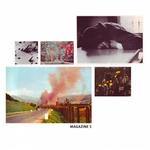
Loops of your Heart And Never Ending Nights
(Magazine)
In a way, the sheer thought of electronic music being an emblem of celebration and release still astounds me. It has morphed and taken on a life of its own into a community of spreadable ideas, different interpretations that continue to surge from one sole source. Like a living organism, it has to abide by the rules of social change, or it’ll weaken and break. Especially now, synthesizers continue to be all the rage – a powerful beacon for the powerless to assemble as a cohesive group, all searching for a voice amidst the mounting hysteria of rising stars and timorous do-it-yourself bedroom recorders. It’s all good fun, but where’s the sense of purpose.
But it wasn’t always this way – I think about those who popularized it into a credible art form, like Kraftwerk, and how they played a role that was much bigger than they could ever imagine. They had a yearning to contribute to a new movement of sound without losing sight of their heritage, one that was still in reconstruction after much discord. But they didn’t do it with disobedience of defiance; after all, its just music. So I can see why someone like Axel Killner would want to set foot in Germany for inspiration – by visiting a place with a musical backdrop that’s been so deeply ingrained in his creative process from the start, he could begin to put into words what always lived in his imagination. Just like John Cage and Pierre Boulez before him, who also visited Germany in search of a novel sound, he has that same desire to break his own conventional narrative for the sake of personal reinvention.
Throughout his three fairly successful releases as The Field, the Swedish producer continually incorporated subtle tweaks to his unique take on techno music. Willner’s records are often cyclical and delirious, devoid of explanation and logic. Coiled but never unfurled, they often drift into lengthened ambient pieces worth getting lost in. But what binds them together is that unexplainable feeling of euphoria and surrender. And Never Ending Nights is an antithesis of The Field’s idyllic, wintry luster – it’s kosmische-inspired sounds are smoggy, carbonized and gasping for air. And if there was any doubt that the accosting siren calls and Moog synths in Little You, You Should Develop prompts you to check for a failed transmission in what appears to be a murky, industrial setting, then Broken Bow colors its shades of grey with an aura of impending danger. What begins as a post-apocalyptic dirge changes gears, sphering a motorik groove until ultimately crashing into a loud, buzzsaw vibration in its rattling final minute.
More attention grabbing is Neukollin, which shares the name to one of David Bowie’s more glum moments in Heroes. Despite the fact that they’re not directly covers, they both carry a gust of unknowingness and dread – a slinky, dub-resembling clang feels intrusive, with its unsettling tick tocks implicating the beginning of an outbreak. Willner employs that same practice of repetition in End, one of the album’s brightest moments, in which a prickly, teetering piano cobbles with an array of cosmic synths. The deceptively simple Cries could very well be his moment of escape, coming out of a storm shelter to gaze at a vast, desolate land – the misleadingly simple track undulates, in a lethargic pace, rocking a swaying motion and modulating highs and lows while it throws all types of sinister trimmings: footsteps, transcendental guitar riffs and vaguely psychedelic soundscapes.
And Never Ending Nights may be Willner’s most fully realized expression in an already impressive body of work. But like any release that follows close ties to past movements, it’ll be pigeonholed with the likes of kosmische musik old hands like Cluster, Popol Vuh and Tangerine Dream. Listening closely will reveal quite the distinction – while most of those groups would rely in little variation and chopped repeated sections, Nights rarely indulges and makes faint transitions while aligning to a set mood piece; these are still constrained to a song format instead of trying to immerse you into a cinematic experience. Like the most taxing musical journeys, imagine subjecting a novice listener to Radio-Activity after Autobahn, it’s meant to slightly discomfort those who’ve become complacent of The Field and transition them into a new direction. And yes, the slightly kitschy, retro-futuristic presentation gives it the impression that it's guarded in a time capsule. Still, Willner treats all the stilted synths and metallic drones with the same master stroke.
14 February, 2012 - 08:54 — Juan Edgardo Rodriguez